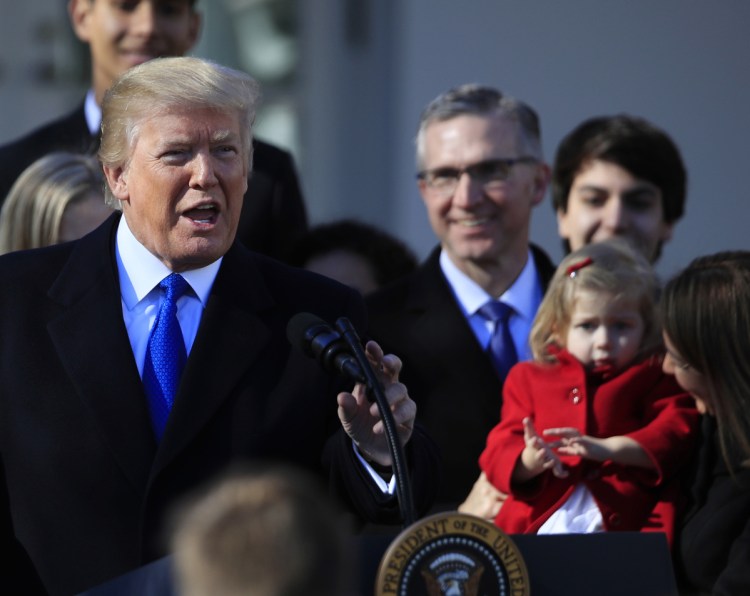WASHINGTON — President Trump has long been an unlikely sweetheart for conservative and evangelical voters. Now, in the lead-up to the midterm elections, the thrice-married former Democrat who used to describe himself as “very pro-choice” is offering catnip to conservative voters with a new administration push to strip funding from Planned Parenthood and other family planning clinics.
The initiative, announced last week, is aimed at resurrecting parts of a Reagan-era mandate banning federally funded family planning clinics from referring women for abortions, or sharing space with abortion providers. And it arrived just in time for Trump to highlight it Tuesday night when he spoke at the Susan B. Anthony List’s annual “Campaign for Life Gala.” The speech, said one administration official, was aimed at a core constituency of conservative activists who will be key to energizing the party entering the midterms.
Marjorie Dannenfelser, president of the anti-abortion Susan B. Anthony List, says the move “will help tremendously” in the midterms.
It’s also the latest evidence that as he frets over the Russia investigation and prepares for a planned summit with North Korea, Trump has also been focused on fulfilling campaign promises and tending to issues that galvanize his base: holding a series of events to rail against the dangers of illegal immigration, pulling out of the Iran nuclear deal and wading anew into the fight over abortion rights.
Trump is far from a natural fit for conservative voters. He recently admitted to reimbursing his lawyer for paying pay hush money to a porn star who claimed she had sex with Trump (a charge that he denies). And Trump has bragged about groping women without their permission. During the campaign, he sometimes had trouble articulating his views on abortion, at one point suggesting women should be punished for having abortions. His campaign later walked back the statement, saying that if abortion were ever outlawed, he believed that doctors who perform them should be punished.
Nonetheless, white evangelical voters overwhelmingly supported Trump in 2016, and that support has only grown. A PRRI survey released last month found white evangelical support for Trump at an all-time high, with 75 percent of those polled holding a favorable view of the president and just 22 percent holding an unfavorable view. Support for Trump within the general population in the poll stood at just 42 percent.
Religious groups like the Catholic Medical Association approve of a series of actions Trump has taken, beginning with his appointment of judges who oppose abortion rights, including Supreme Court Justice Neil Gorsuch, and Trump’s reinstatement of the global “gag rule” that bars federal funding for nongovernmental organizations that provide abortion referrals.
The White House also points to the administration’s support for religious objectors in court and Trump’s efforts to bring religious groups “back into the fold by ensuring religious groups and their partners are critical participants in the policy making process.”
Trump has also surrounded himself with staffers with deep ties to conservative groups, including counselor Kellyanne Conway and Director of Strategic Communications Mercedes Schlapp.
Ralph Reed, chairman of the private Faith & Freedom Coalition, also pointed to the president’s dismantling of the Iran nuclear deal and his decision to move the U.S. Embassy in Israel from Tel Aviv to Jerusalem as steps that have played especially well with evangelical voters. But he said the president’s actions on abortion hold special sway, in part because of Trump’s early struggle with the issue.
“On a policy level, I see it as a series of promises made and promises kept. And in this case, a pro-life promise made and pro-life promise kept. And I would argue those are the most important promises to keep because he was someone who was believed, accurately or otherwise, as a recent arrival to conservatism and someone who had an ideologically mixed past,” Reed said.
Reed added that as president, “Trump has done everything that he can to keep faith with the faith-based voters that provided him with his margin of victory in 2016.”
When it comes to the midterms, Reed said, “I expect Donald Trump to be rewarded for these efforts by a similarly historic turnout among evangelical and other pro-life voters.”
Dannenfelser, whose group works to elect candidates who want to reduce and ultimately end abortion, is planning to raise and spend $25 million this cycle, up from the $18 million the group spent in the lead-up to the 2016 elections.
She said the president’s latest move would play especially well with voters in states like Missouri, where Republican Attorney General Josh Hawley is challenging Democratic Sen. Claire McCaskill, one of the Senate’s most vulnerable incumbents, as well as in Indiana and North Dakota, where Republican Rep. Kevin Cramer is challenging Democratic Sen. Heidi Heitkamp.
Abortion rights activists, meanwhile, argue that Trump’s moves on the issue will only embolden women to turn out at the polls, just as they took to the streets in marches after Trump’s election.
“It’s going to cost this administration at the ballot box in November,” said Planned Parenthood Federation of America’s Kevin Griffis.
“We have to fight back in the best way we know how,” the group Emily’s List wrote in a fundraising email, “electing pro-choice Democratic women who will always protect reproductive freedom.”
Send questions/comments to the editors.



Comments are no longer available on this story